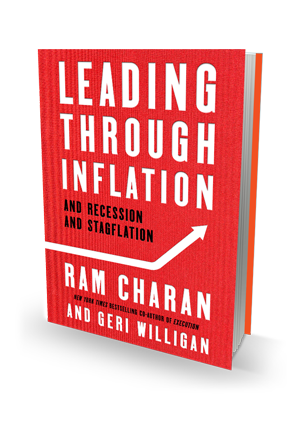Dr. Ram Charan provides insight, innovation and imagination to leaders coming to terms with rising inflation.
Described by Fortune magazine as “the most influential consultant alive,” Ram Charan is a celebrated thought leader and author with over 40 years of experience working with leading companies across the globe. We had the privilege of interviewing him to find out what businesses can do to stay ahead in these inflationary times. Dr. Ram Charan learned business basics while working in his family’s shoe shop in a small town in northern India. He earned an engineering degree in his home country, then did MBA and doctorate from Harvard Business School, where he graduated with high distinction and was a Baker Scholar. He served on the faculties of Harvard Business School and Northwestern University before pursuing consulting full-time.
Having worked with companies including Toyota, Bank of America, Novartis, Fast Retailing (Uniqlo), and many more, Charan knows what it takes to run a business well, even in the most adverse of situations. Here, he talks about the current period of high inflation and explains what businesses can do to thrive, even in the toughest of circumstances. Adversity is an opportunity to build the future.
What are the biggest challenges that inflation presents to businesses today?
First, I would say that psychology is the most important challenge because once people begin to believe that inflation is here for a period of time, they begin to take action to protect their cash flow. Therefore, the psychology of management teams and the psychology of consumers and regulators are central to prolonging inflation. It is the hardest to tame.
In the US, there’s now a lot of distrust of the Federal Reserve – the main regulator – because they got the inflation timing wrong. They missed the bend in the road and failed to implement a cohesive action plan. That mistrust has only grown now that the stock market is down 20%, and there is no sign of inflation abatement.
All this challenges businesses that must get to grips with the universal underlying principles of inflation – principles that are not theoretical but are common to most inflationary periods. By doing this, they will have the right mindset to not only get through the recession but come out stronger at the end of it.
Can you explain these key principles?
I believe there are five key principles that management should really master:
- Principle #1: Manage your cash
There are no ifs and no buts here. Cash is king. Don’t manage for earnings per share or EPS, and don’t manage for artificial revenue growth because this will mean you will measure in terms of inflationary dollars, which is misleading. Companies need to come to terms with this.
- Principle #2: You’ll need more cash to do the same volume of business
The same volume of business you have been doing will need more cash during times of inflation, so it’s important you plan for that by either generating more money, borrowing it, or sharpening your business portfolio of products and customers, which might mean you become smaller.
- Principle #3: Eliminate the cash traps in your end-to-end value chain
Going back to the principles of psychology, it’s natural for managers to want to preserve cash in their company during times of inflation, so you may find they may pay later than usual or not at all. Keep a lookout for these cash traps in your entire end-to-end value chain, and make sure your accounts receivable department is on top. The same applies to hoarding inventories.
- Principle #4: Don’t be scared to raise your prices
Inflation means prices will go up right across the board. Import prices have gone through the roof, and wages are increasing by 12% annually in some sectors. At a time when 70% of your cost is your people, you need to prepare for your costs going upwards of 40% in the next three years. To recoup some of this, your prices must change now. It’s difficult, but – even if a competitor slashes prices to gain market share, do not sacrifice your cash. Instead, find a way to differentiate – deliver a better product, better delivery, or better customer service, and you will regain your footing. Cash is more important than gaining market share by price cutting when your costs are increasing. Fear not the competitor unless it has better productivity or an unusual cash hoard.
- Principle #5: Make better use of customer data
We live increasingly digital lives – in fact, almost 80% of the world’s population now buy online. Every transaction we make – and every move we make online – creates data. So today’s companies have access to an extraordinary amount of information. Learn to use it correctly, and you can achieve a significant competitive advantage.
What advice would you offer firms at the beginning of their digitalization journey?
First, I want to reassure these businesses that digitalization doesn’t have to be expensive, and any costs will undoubtedly be recouped from the benefits.
I firmly believe that, in these times, for most businesses, pursuing digitalization is your only choice if you want to succeed.
Now, it doesn’t need to be scary – and you do not need to do it alone. Companies like Fractal are very well-equipped to help you on your journey and to uncomplicate the tools you can use to analyze customer data more effectively. So, if I had one real bit of advice, it would be to seek an expert in this area who can guide you forward. Great companies are treating such outsourcing companies as long-term partners.
How can companies innovate to stay ahead in an unknown future?
Inculcate the belief that the customer wants continuous innovation and pursue it earnestly. It’s never been more imperative. This means truly understanding your customers’ needs and tracking how consumer behavior changes. Part of getting this right goes back to my point about implementing technology and analyzing data. Still, it’s also essential to get out there and watch your customers in action. Our most innovative companies today travel all over the world to find out what their customers want – and once you know that you are far better placed to succeed.
In tough times, the tough get going. In inflationary times, business leaders need untapped skills in a zero-interest-rate environment. What they do now will determine whether their company will prosper or disappear.









